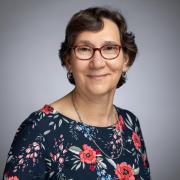
Delivering Human Services During the Pandemic: Interviewing Michelle Rhone-Collins, CEO LIFT
CBPP recently partnered with LIFT, a human service organization that works in underserved communities of color in Chicago, Los Angeles, New York City, and Washington, D.C., to examine the pandemic’s impact on families with children with very low incomes and limited savings living in neighborhoods hard hit by the pandemic. We asked LIFT’s CEO, Michelle Rhone-Collins, what LIFT has learned and how it adjusted its work to respond to families’ needs.
Q: Please tell me a little about the families that LIFT serves and how you serve them.
Ninety-one percent of the parents we partner with are female, and a 99 percent are women of color. The average mother comes to us with over $14,000 in debt and a yearly income of just about $15,700. We operate in underserved neighborhoods of color with extremely high poverty rates. In Chicago and Washington, D.C., LIFT serves mostly Black families. In Los Angeles, LIFT serves mostly Latinx families: 50 percent do not have a legal right to work and nearly 50 percent are monolingual Spanish-speaking. About half of the LIFT families in New York City are English-language learners.
Through individualized coaching, LIFT partners with its members to improve their personal well-being, increase their social connections and improve their financial strength. A unique feature of our service model is our Family Goal Fund, which provides cash to parents facing a crisis, such as needing money to obtain a certification needed for a job, but not having the $500 to pay for it; $1,000 to pay for childcare so they can keep a recently secured job.
Before the pandemic we distributed nearly $350,000 through our Family Goal Fund directly to parents — not as a handout, but as an investment in them as the CEOs and entrepreneurs of their families. Volunteer coaches, many of whom are students pursuing master’s degrees in social work, deliver most of our services.
Q: How has LIFT changed its work in response to the pandemic?
First, we had to quickly shift our coaching model from in-person to virtual, which wasn’t easy. Early on, we asked our families about their experiences and what they needed from us. They told us that they needed $1,100 on average to stay on stable ground during this turbulent moment. So that’s what we set out to give them.
We're proud to say that LIFT has exceeded this goal, distributing emergency cash transfers of $1,400 to all 790 families in our program. Families who aren’t eligible for support from federal relief measures, including undocumented parents, received $1,950 each. This unrestricted financial support totals more than $1.2 million in direct cash assistance to families in need.
Our families have used those funds to pay for the basics: rent and utilities, food, diapers, and personal hygiene supplies. Occasionally, they’ve used some of the funds for special treats for their children, whose routines have been disrupted by the pandemic.
The false “welfare queen” stereotype has made direct cash payments unpalatable for a generation of families, but that’s what our families need. That blind eye toward innovation stunted investment in our safety net, and we’re acutely feeling it right now. A catastrophe like COVID-19 has unearthed the racial and gender inequity built into our economy. Now is our chance to fix it.
Q. What do we need to do to support families going forward?
We need to give cash now, across the board. And then we need to build with approaches that also consider how social connection and well-being affect financial stability — the hope, money, and love that we will all need to rebound from this.
We don’t need data to tell us what we see every day: women and people of color are fighting tooth and nail to access the same opportunities that white people have, but systems that are racist and sexist by design are holding them back.
Public policies must consider families in poverty with more complexity and for their humanity, rather than simply through stereotypes, numbers, or a checklist of criteria. And the systems that serve vulnerable communities need to be simplified. We need to remove the barriers of bureaucracy, siloed agencies, and confusing prerequisites for receiving aid and instead treat families with dignity and trust.


The views and opinions expressed in this post are those of the author(s) and do not necessarily reflect those of MomsRising.org.
MomsRising.org strongly encourages our readers to post comments in response to blog posts. We value diversity of opinions and perspectives. Our goals for this space are to be educational, thought-provoking, and respectful. So we actively moderate comments and we reserve the right to edit or remove comments that undermine these goals. Thanks!